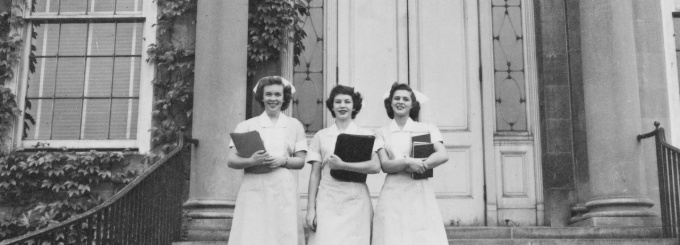A Legacy of Excellence: The History of the UB School of Nursing
For nearly 90 years, the University at Buffalo School of Nursing has been a leader in nursing education, offering high-quality programs in a dynamic and innovative university environment.

Nursing students, circa 1950.
Our Founding
Established in 1936 as a Division of Nursing within the School of Medicine, the University at Buffalo School of Nursing has a long history of excellence in nursing education. In 1940, it became an independent unit of the university, laying the foundation for its growth and impact as one of five UB health sciences schools.
The School’s early baccalaureate programs were tailored to meet the educational needs of hospital school graduates, addressing the evolving demands of the nursing profession.
Foundations of Nursing Education at UB
The University at Buffalo School of Nursing established its master’s degree program in 1943, marking a significant step forward in advanced nursing education. Early graduate programs reflected the evolving needs of the profession, emphasizing specialization in teaching, supervision, and administration.
In 1950, the School launched its generic baccalaureate program, admitting its first cohort of students and further expanding educational opportunities for aspiring nurses.
Advancing Nursing Education: The Evolution of UB’s Master’s Programs
In 1964, a significant curriculum revision introduced clinical concentrations to the University at Buffalo School of Nursing’s master’s degree program. These concentrations included functional areas such as teaching, nursing service, and administration.
As health care delivery evolved and the demand for advanced clinical nursing expertise grew, the program transitioned away from functional areas. Instead, students pursued preparation as clinical nurse specialists, nurse practitioners (NPs), or nurse anesthetists.
UB SON has benefitted from the contributions of esteemed national leaders who shaped these programs. Faculty members such as Bonnie Bullough, PhD, FAAN, Adele Pillitteri, PhD, RN, PNP, and Patricia Burns, PhD, RN, FAAN, were pioneers in advancing the NP movement. Ira Gunn, CRNA, MLN, FAAN, a trailblazer in nurse anesthesia education, also played a pivotal role in the development of UB’s nurse anesthesia program.
Research Doctoral Programs in Nursing: Evolution and Milestones
The Doctor of Nursing Science (DNS) program, introduced in 1988, served as a cornerstone of advanced nursing education until its closure. The final cohort graduated in 2008, and admissions to the program are no longer available.
In 2004, under the leadership of Jean K. Brown, PhD, RN, FAAN, the School of Nursing launched its PhD in Nursing program. This program, a significant addition to the State University of New York (SUNY) system, is one of only three nursing PhD programs within the SUNY network and among just three in New York State located outside the New York City metropolitan area.
Accelerated Pathways to Nursing: The ABS Program
In 2003, the University at Buffalo School of Nursing introduced the Accelerated Bachelor of Science (ABS) program to meet the needs of students pursuing nursing as a second degree. Designed for individuals with prior academic or professional experience, the program has experienced sustained success, with increasing applications and enrollment year after year.
Doctor of Nursing Practice Established
The Doctor of Nursing Practice (DNP) program, accredited in 2012, originally offered both post-baccalaureate and post-master’s pathways to prepare advanced practice nurses. The post-baccalaureate program included four specialties:
- Adult-Gerontology Nurse Practitioner (AGNP)
- Family Nurse Practitioner (FNP)
- Psychiatric/Mental Health Nurse Practitioner (PMHNP)
- Nurse Anesthesia
The post-master’s program included these four specialties, along with three additional options:
- Adult-Gerontology Clinical Nurse Specialist
- Child Health Nurse Practitioner
- Women’s Health Nurse Practitioner
UB School of Nursing Today
The University at Buffalo School of Nursing (UB SON) offers three Bachelor of Science (BS) degree pathways to accommodate diverse student needs:
- Traditional BS in Nursing for first-time undergraduate students.
- Accelerated BS in Nursing (ABSN) for individuals transitioning to nursing as a second career.
- RN to BS program designed for registered nurses seeking to advance their education.
The Doctor of Nursing Practice (DNP) program provides specialized tracks to prepare advanced practice nurses, including:
- Adult-Gerontology Nurse Practitioner (AGNP).
- Family Nurse Practitioner (FNP).
- Nurse Anesthesia.
- Psychiatric/Mental Health Nurse Practitioner (PMHNP).
Additionally, a post-master’s DNP offers pathways for seven advanced specialties:
- Adult-Gerontology Clinical Nurse Specialist.
- Adult-Gerontology Nurse Practitioner (AGNP).
- Child Health Nurse Practitioner.
- Family Nurse Practitioner (FNP).
- Nurse Anesthesia.
- Psychiatric/Mental Health Nurse Practitioner (PMHNP).
- Women’s Health Nurse Practitioner (WHNP).
The PhD in Nursing program includes options for post-BS, post-MS and post-DNP entry points, enabling nurses to advance their careers in research and academia.
Founded: 1936
Dean: Annette B. Wysocki, PhD, RN, FAAN, FNYAM
Students, Faculty and Alumni
- 350 undergraduate students
- 250 graduate students
- 40 full-time faculty
- 8,000+ alumni
Degrees Awarded: BS, DNP, PhD
- BS Program: Traditional, Accelerated, RN to BS
- DNP Program: DNP, Post-MS DNP
- PhD Program: Post-BS PhD, Post-MS PhD, Post-DNP PhD
Advanced Certificates
- Family Nurse Practitioner
- Psychiatric/Mental Health Nurse Practitioner
National Accreditations
- CCNE (BS, DNP, APRN certificates)
- COA (Nurse Anesthetist Program)
